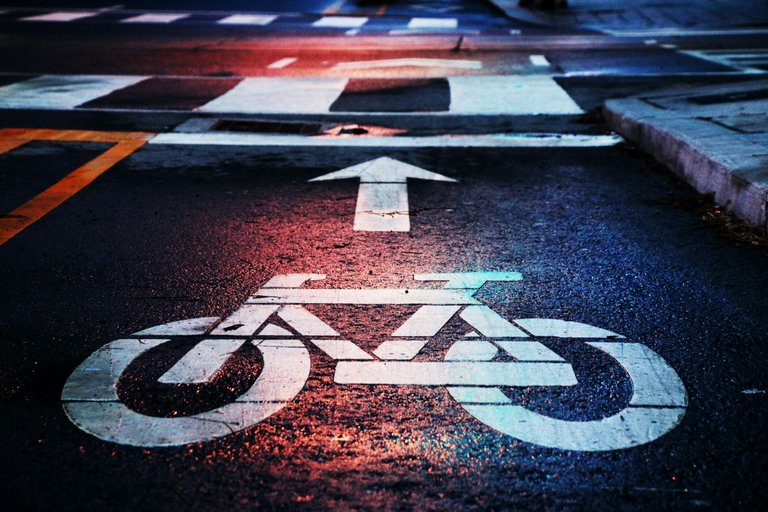Cycling: Defensive cycling skills & handling traffic
Heeeyho Readers! Let's talk about cycling safety in traffic
Today's blog idea comes from @friendlymoose's post about Cycling and safety. In his post, he discusses some important topics regarding our safety while cycling in traffic. He summed up well-enough the most important aspects we [cyclists] have to consider, and the comments complement his text. What else can I add?
Consider checking friendlymoose's post: Cycling and safety
Well... I can add my experience regarding defensive cycling. I have crashed once in traffic — resulting in a broken leg — and had several close calls while rushing the streets to deliver food in a major metropolis.
Isn't that the opposite of being safe?! {laughs}. Sorta. The more one risk — and some of us, couriers, racers, adrenaline seekers etc etc risk a lot —, the better one gotta be at calculating the moves. For the daily commuters, the same rules and skills apply regarding defensive bike handling.

Defensive cycling in simple terms means: Be the fucking aware! Even when it's not our fault, cyclists will always be weaker than motored vehicles. For that reason, assuming that everything around is a threat to our safety is so important. Don't confuse defensive to passive; being defensive requires a lot of action.
Defensive cycling involves always being aware of what is going on around to 1. predict 2. prepare 3. act/react to put oneself in the best possible safe position.
Always expecting the unexpected!
As a rule of thumb, assume that others do not see you and it's your duty to signal 'hey, I'm here!'. Bright lights, gestures, eye contact, waving, shouting — all that helps. Friendlymoose covered all that in his post, so let's focus on skills that might be helpful to make you act more quickly.
Developing cycling skills
Considering that you are aware of traffic and your surroundings, having better cycling handling skills will spare you a lot of trouble. I'd like to enumerate a few ideas, from beginner to more advanced. Remember that we have to start somewhere and it's always a good idea to go somewhere safe to train some skills before tackling the streets.
1. Train your balance
If you are starting out as a cyclist (as a commuter or whatever) I highly advise to train your balance. That will help a lot in traffic, to cycle through tight spaces without bashing on stuff or even cycling in a straight line. Believe me, I've seen novice cyclists zigzagging on the bicycle lane, which is safe for nobody.
Finding fun obstacles is a great way to start. Go somewhere safe and have a blast trying to cycle as slow as you can without touching the ground, try to perform really tight turns, try to pass through tiny spaces, etc. You'll see your confidence go through the roof in no time.
Part of having a good balance is learning to cycle while looking back over your shoulder without turning, or looking to the side. Practice, practice, practice.
2. Use of gears and brakes
Bicycle gears are fundamental to cycle in traffic as they give us the ability to react fast. To heavy of a gear and you'll be slow to accelerate out of trouble; to low and the same happens. The proper gear selection will help you keep up the pace in traffic, which translates into a more reactive handling. Example.: Accelerating out of traffic lights, or accelerating to overtake something before incoming traffic, etc.
As fundamental as being able to accelerate, is being confident to brake on different conditions. Not always do we cycle on smooth asphalt. Are you able to brake over sand? Over wet? Most beginners don't know how to modulate their braking. You go too hard on the front brake and the wheel washes off; too hard on the rear brake and you'll skid. Learning to modulate both brakes is key to cycle safely on any terrain.
3. Reactive skills
From now on we start to dip into more advanced territory. Reactive skills comprehend a set of skills that are almost instinctive, like quickly avoiding a pothole on the street or learning to throw the bicycle to the side to avoid hitting the handlebar onto something (e.g. car rearview mirror or a distracted pedestrian). Developing these quick maneuvers require balance, and the only way to train is by challenging oneself. I am always practicing, even as a long-term racer, and the best way is to play with the bicycle trying to avoid obstacles or zigzagging through road markers.
4. Learning one-hand cycling and standing up on the pedals
If you want to use hand signals in traffic, or wave to a driver to make sure he see's you, one-hand cycling is a must. What can I say? Practice.
Also, learning to cycle while standing up is useful to look ahead in traffic and helps with bicycle maneuvers in certain situations.
5. Jumping & falling
Fifth on the list is the more hardcore stuff. Jumping over obstacles is not only for racers. Sometimes there's no time to avoid something on the road, so the only resort is to jump over whatever is on the ground. Or when you are forced into/off the sidewalk and have to jump the curb. There are many situations where jumping will save you.
On the other hand, when all of the above fails, the only end is the ground. Do you know how to fall? Or are you the sack of potatoes type of cyclist? {laughs}. I'm not sure there's a proper way to train how to fall other than falling, but, certainly, learning a proper way to hit the ground may save you some trouble.
Conclusion
This post turned out quite dense, but I hope it gives a general idea to those considering the two-wheeled option in their life. Cycling is like driving — the more you pedal, the easier it gets, and those skills will become more and more natural.
The key takeaway to become more proficient, aware, and skillful is to have fun. Don't be afraid to challenge yourself. Go somewhere safe and try different stuff, cycle over loose sand to develop balance, tackle steep streets to learn how to change gears, try to brake as quick as possible, etc.
And one last note: Wear a helmet!
Peace.
Did you know that I have a book out? Check this!
Access Link: https://www.amazon.com/dp/6500272773?
If you enjoyed this post consider leaving your upvote for a hot coffee.
Find me on Twitter: https://twitter.com/mrprofessor_
~Love ya all,

Disclaimer: The author of this post is a convict broke backpacker, who has travelled more than 10.000 km hitchhiking and more than 5.000 km cycling. Following him may cause severe problems of wanderlust and inquietud. You've been warned.


Nice addition to the post I made earlier!
I had never heard of the term defensive cycling before, but the tips you give are very good.
I have quite a good balance and I can also control my bicycle pretty well. With a road bike jumping on curbs is sometimes necessary, but scary since the tires are very narrow.
And braking is very important too.
Using your front and rear break together can be essential if you need to make an emergency stop. Never only use your front break for that ir you will be launched.
And maybe even important as braking is knowing when not to break. Sometimes in wet or icy circumstances braking can cause you to smack on the asphalt. I once decided not to break in an icy turn and drive my bike in the nearby bushes instead. It caused me some bruses, but braking in this case would probably have resulted in fractures.
Are you on Discord too?
Come join the Cycling Community channel then! https://discord.gg/qa6mdbwdJs
Upvoted by the Cycling Community
Come join the Cycling Community and share your rides, bicycle, maintenance, news or any other cycling related content!
Supporting the Cycling Community
You can help the Cycling Community to support cyclists on Hive by delegating Hive Power or following our Curation Trail (via https://hive.vote: @hive177745)
You can select the Hive Power you like to delegate here:
25 - 50 - 100 -250 - 500
I actually stole that term from the driving school. Damn icy patches! I crashed on those twice when crossing Europe during the winter; the road looked perfectly fine, but I soon discovered it was slippery fuckery all around. The solution was to deflate the 2.35 tires down to the max and just keep on going. But just as you said, a tiny little touch to the front brake would wash off the front wheel
Here you just need to always be moderate, there are certain situations when you can fly like a mad fury. And there are moments when the situation is not in your favor and here you need to understand that you need to "slow down" and just get home.
Cyclist needs to have an upfront knowledge to keep moving. One cannot just jump into it, but must move according to the rules.
We have to do everything possible to protect ourselves in traffic, unfortunately.
What great content, I really liked your presentation, they are very important things that we must consider to always set the best example as users of this wonderful means of transportation.
Great post!
I will add about the brakes in the first place, but in general and everything else, do not forget about the technical condition of your bike. Because there may be a situation when you can brake well, and of course, control the bicycle. But what about when it's broken or worn out? You may find yourself in a bad situation where you know how to do it, but one of the components fails.
I would also add that you need to learn to relax physically and at the same time be alert, you need to get used to it. That is, don't be tense all the time, but at the same time, don't be too unfocused. And the more traffic, the more attention.
And don't be like the "sack of potatoes" as we call it. Where you have to get out of the saddle, stand up on the pedals as the author said (in tourist trips, this also gives you a better view of the beautiful scenery because you are higher than those who drive a car), relax your body, but don't lose control. It's like in fencing movies, don't grip the sword too tightly, but don't relax too much either.
Great addition about bicycle maintenance! I've seen ppl literally going out for a ride with loosen bolts on the bicycle, even those quick-release hubs opened. Also checking batteries for the lights and such in case of going back home at night.
I forgot to add - you should know the traffic rules because many cyclists ignore them.